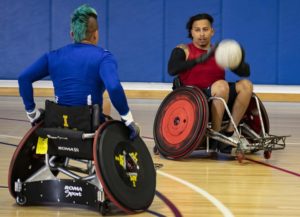If you have never witnessed wheelchair rugby in person, you should make it a point to do so. The sound of the wheelchairs rushing up and down the court and the metal-on-metal collision of those same wheelchairs is an experience in and of itself. The athletes maneuver their chairs with grace, finesse, and ferocity all at once—an image unique to the sport commonly referred to as “murderball.”

Retired Army Sgt. Ryan Major and retired Army Staff Sgt. Joel Rodriguez discovered the sport after suffering serious injuries. Major was injured after stepping on an improvised explosive device in Iraq in 2006, which resulted in the loss of his right leg and right thumb from the explosion and later his left leg and ring and pinkie fingers to a fungus. Rodriguez was injured in a serious car accident where he suffered a broken neck and a severe spinal cord injury. Both have fought through dark places in their respective recoveries and found light again with the help of adaptive sports, particularly wheelchair rugby.
“Wheelchair rugby is probably the best physical therapy I can get,” said Rodriguez, who has played for four years. “There’s nothing like pushing around a 30-pound wheelchair and smashing into somebody as hard as you can.”
For Major, wheelchair rugby has helped him build his self-confidence and keeps him accountable to his teammates to stay in shape and train. “Competition and sports has been a significant part of my recovery,” said Major. “Growing up, I played football, baseball, and I wrestled and played other sports where I had to put in the hard work training. Rugby has given that back to me and seeing the results of that hard work puts a smile on my face every time.”
Wheelchair rugby has also given Major and Rodriguez the opportunity to be on a team again and enjoy the camaraderie. “I love team sports because it feels like I’m back in the military, being on a team again with people all working together for the same goal to accomplish the mission: winning,” Major said.
For Rodriguez, being around others who deal with similar injuries and challenges also draws him to the sport. “Mentally, playing rugby has been great,” Rodriguez said. “It gives me the chance to be around other people in the same predicament as me and gives me the motivation to succeed and seeing them succeed as well. It also helped me find my competitive edge and mindset again.”
This article is based on an original story by Christopher Fields, U.S. Army Warrior Care and Transition.